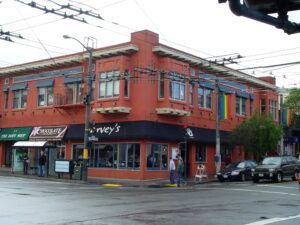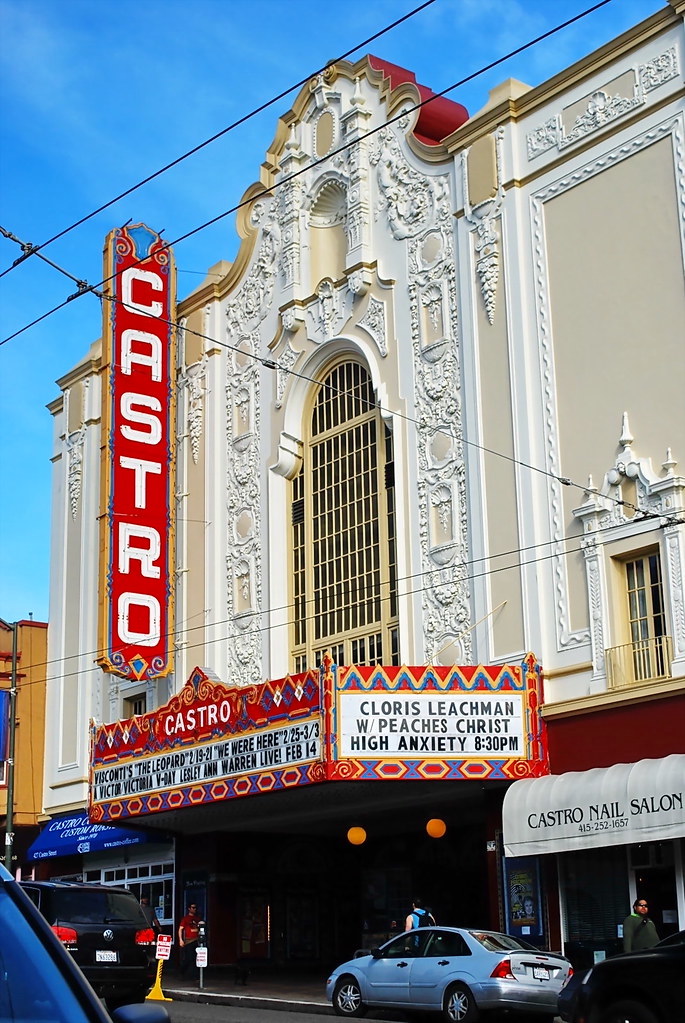San Francisco’s escalating rent prices have dealt severe blows to businesses across the city. However, the Castro District stands as a remarkable exception with iconic establishments in the Castro–such as Harvey’s and the Castro Theater–defying this downward economic trend through the power of community organizing and unique sense of unity.
From 2019-2023, 47% of downtown San Francisco businesses have been forced to close, according to the San Francisco Standard. The Mission District has also struggled with supporting businesses with prominent institutions such as Stuff, San Francycle and more shut down in the last few years after being unable to bounce back after high rent and dips in profit during the COVID-19 pandemic.
In addition, San Francisco is grappling with a large budget deficit and Mayor London Breed has cut about 10% of the city’s budget to compensate for loss of revenue. This deficit threatens further business closures. While certain neighborhoods are more affected than others, the Castro District has seemed to successfully combat this economic slump.
The Castro District is a 337 acre neighborhood in Eureka Valley known worldwide for its gay culture and community. The Castro’s queer history began following World War Two, when many military personnel who were discharged for their sexual orientation returned to San Francisco, knowing its reputation of tolerance and open-mindedness. By 1980, 17% of the city identified as homosexual.
When the AIDS epidemic began in the 1980s, the Castro suffered greatly, but the queer community mobilized to fight negative stereotypes associated with the disease, taking care of those affected by the epidemic.
Andrew Goldfarb, a longtime gay resident who moved to San Francisco and the Castro in 1989, said, “When I moved to the Castro, it was the middle of the AIDS crisis. The district was a sad place in some ways, but the epidemic also made it even more of a center for gay people.”
The AIDS crisis pushed many people out of the closet, creating a level of visibility for the queer community that didn’t exist previously. As the infection rate and death toll continued to rise, community based organizations began to pop up around the Castro, advocating for queer rights.
The Castro’s central role in organizing during the AIDS epidemic cemented its position as the queer epicenter of San Francisco and the world. An employee at Cliff’s Variety, a local business, said, “The Castro has been a beacon for many young people throughout the world to visit, especially years ago when there was nowhere else to go to be yourself.”
Gay bars and many LGBTQ+ owned businesses are known as the heart and soul of the Castro, and play a direct role in the Castro’s continued importance today. Santiago Cobarrubias ’24, a resident of the Castro district, says, “The Castro also has many LGBTQ+-owned businesses, which I love because its businesses are run by similar people to the community that they are trying to serve.”One of these businesses is the Castro Theater located on 429 Castro Street. The Castro Theater was first built in 1922 by San Francisco theater entrepreneurs, the Nassar brothers.
In the 1970s, the theater became known for its screenings of LGBTQ+ movies, and in 1977, due to its importance, the Castro Theater became a protected landmark of San Francisco. When the AIDS epidemic began, it became a place of solace for the queer community, a space of joy and kinship in the face of constant loss and death.
Over the years, the theater went through a series of owner changes until 2001 when the Nassar family took over the theater once again and began to expand operations.
When the COVID-19 pandemic hit in 2020, the theater suffered greatly like many independent movie theaters across the country. For almost three years, the theater’s future was in limbo, with the expectation that it would be converted into a concert venue by concert promoter Another Planet Entertainment (APE).
The idea faced a great deal of backlash from the queer community who protested the removal of the permanent theater seats which had survived with the theater through decades of history. The “Save the Seats” campaign was launched by community organizers to preserve Castro’s legacy as a repertory movie house.
After discussion and compromise, in January of 2023, APE finalized plans for the future of the theater, calling for a year-long closure of the theater to implement changes. These plans include restoring the Castro theater while maintaining its important historical features, removable seating to accommodate for different venues, increasing accessibility and additions to mechanical systems. While many people are against these changes to the historical theater, APE promised to feature at least 25% of LGBTQ+ media in the theater’s future repertoire.
Another key business in the Castro that has had to undergo changes due to high rent was Harvey’s, a historical gay bar located at 504 Castro Street. In 1974, a bar opened at 504 Castro named Elephant Walk. Elephant Walk was extremely influential in the Castro, featuring entertainment by a prominent singer, Sylvester, world-renowned for his flamboyant, androgynous looks.

photo courtesy of Public Domain
The bar was praised by Harvey Milk, the first openly gay man to be elected to public office in California, who owned a camera shop up the street. In 1978, Milk took office but was murdered by a fellow supervisor, Daniel White; he was convicted for his crimes but was served a sentence of manslaughter, causing riots in the Castro. Understanding the bar’s importance to the community, in retaliation to the riots, the San Francisco Police Department attacked Elephant Walk.
After years of being open, in 1996, Elephant Walk reopened with a new name: Harvey’s in honor of Harvey Milk. Up until the pandemic, Harvey’s continued to be a lively bar, but in 2023, having suffered from a huge decline in patrons, the bar posted a sign announcing to the public that it was closing after 27 years. Shock rocked the LGBTQ+ community, and the bar was bought by a new ownership group.
This group renamed the bar The Pink Swallow. Joshua J. Cook, a member of the new ownership group, said, “The name of the bar is a play on words and has multiple meanings.” According to Cook, Pink, reminiscent of the pink triangle, pays homage and respect to the Castro and queer community. The Swallow has often been associated globally positively, representing love, rebirth, luck and loyalty. The bar carries on a tradition from the LGBTQ+ community naming the bar after a bird, something that was popularized around the 1950s when the LGBTQ+ community was subjected to constant discrimination and mistreatment. Bars often carried names including birds to signify that they were safe spaces for queer folks.
While both Harvey’s and the Castro Theater are facing temporary closure and changes, both businesses encapsulate the Castro district and the LGBTQ+ community’s resilience to the huge wave of closures in San Francisco.
Currently, 45% of businesses in the Castro are LGBTQ+ owned and 72% of them have queer employees. Businesses in the neighborhood play a huge role in the uplifting of the queer community of the city, but also heavily depend on revenue from the queer community.
While San Francisco’s future is bleak and uncertain amid a huge budget deficit, the Castro defies these norms. Adam Thongsavat, legislative aide to District 8 Supervisor Rafael Mandelman who represents the Castro, says, “Whether it’s nightlife, the emerging arts scene, the diversity of small businesses – legacy and new shops – I think there’s a lot to be optimistic about in the Castro.”







